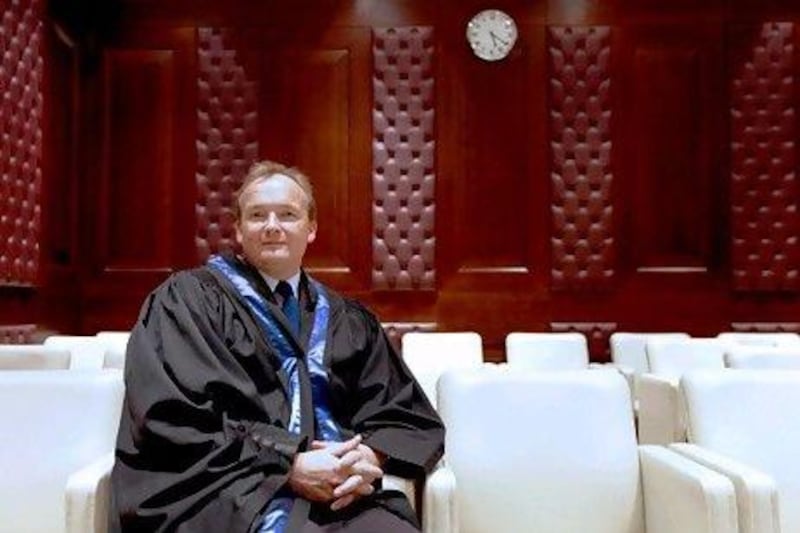Mark Beer is the registrar of the Dubai International Financial Centre Courts. Here he gives his view of the increased powers that DIFC Courts was granted in October.
q&a
q: DIFC Courts has announced its first resolution of a non-DIFC case since the jurisdiction extension announcement. What is the significance of this?
a: The first case under the new law was a significant milestone for the DIFC Courts. We believe that the jurisdiction extension was in itself one of the most important developments in regional justice for some years.
We expected the most immediate response to the broadened access to be from Dubai's SME [small and medium enterprises] sector, which had been vocal for some time about its desire to use the English language, common-law courts, in particular our Small Claims Tribunal [SCT].
The SCT, our mediation service, which removes the need for lawyers and legal fees, has taken hundreds of case inquiries since October.
A case begins once both parties have agreed to the DIFC Courts' jurisdiction, and then a settlement is usually reached within three weeks, which we are proud to say was the experience in this first case. The resolution, between two Dubai-based SMEs, was also reached just before the end of 2011. It was nice to finish the year having tested the new jurisdiction and so send a clear message to the business community that we are here and ready to resolve problems with a continued commitment to customer and community service.
q: Do you anticipate a big volume of similar cases going through DIFC Courts? How many?
a: Yes, we do anticipate an increased volume of cases similar to the first case going through the DIFC Courts. The first case was in the Small Claims Tribunal, related to an unpaid invoice and was between two Dubai-based SMEs.
We understand that 90 per cent of Dubai's economy is made up from SMEs, and non-payment issues in this market are as common, and as damaging for SMEs, as anywhere in the world.
This is the first time these companies have had an English-language, dispute-resolution option available to them in Dubai.
The fact that there are no lawyers, and so no legal fees, associated with an SCT case at the DIFC Courts, and that cases are settled swiftly and efficiently, is a compelling proposition for smaller businesses that do not have the resources or time to spend chasing bad debts.
Judging from the hundreds of inquiries received by the DIFC Courts since October, we are forecasting a … 100 per cent increase in the SCT's caseload in the year ahead.
We are also expecting an increase in the Court of First Instance (CFI). This court hears cases of a more complex nature, where the claim amounts are much higher. We know that the major local and overseas law firms are drafting their clients' contracts to feature the DIFC Courts' jurisdiction and are considering shifting existing disputes to the DIFC Courts. In the Court of First Instance, we expect to see slightly less of an increase in caseload volume, but a considerable increase in the total value of claims heard in the year. Of the 100 or so cases heard in the CFI over the past three years, the value of the claims exceeded Dh3 billion [US$816.7 million]. We would not be surprised if the CFI will hear cases with a value exceeding that figure over the next 12 months alone.
q: Does the fact that non-DIFC entities are looking to use the new service demonstrate defects in Dubai civil law?
a: Not at all, the key differentiator between the DIFC Courts' common-law and the Dubai Courts' civil-law offering is that the former is conducted in the English language and the latter in Arabic. This will clearly appeal to the segment of business in Dubai that is conducted predominantly in English. Dubai has given its business community, as well as those looking to invest in Dubai, a choice.
q: Are there other areas of the civil jurisdiction you feel might benefit from a similar treatment?
a: The October decree to extend the DIFC Courts' jurisdiction gave anyone access to the world-class justice available at the DIFC Courts, be they an individual or business based in a UAE free zone, another regional market, or anywhere in the world.
For some time, there had been calls from the UAE business community to allow them to choose the DIFC Courts for their disputes, and this was particularly prevalent from the free zones, where foreign businesses, predominantly those operating in English, were familiar with the procedures used in the DIFC Courts to resolve disputes. In addition, investors looking to establish operations in the region now have the option of an Arabic-language, civil-law court or an English-language, common-law court to enforce their contracts and resolve their disputes.
q: Dubai has in the past been criticised for not having the "soft infrastructure" of a modern business and financial centre. How much further is there to go to rectify this?
a: The extension has been seen as a major commitment by Dubai to local and foreign businesses and investors, providing choice and flexibility. Unlike many of the world's other financial centres, Dubai now offers two judicial systems serving the needs of the entire business community, whether operating in Arabic or English.





